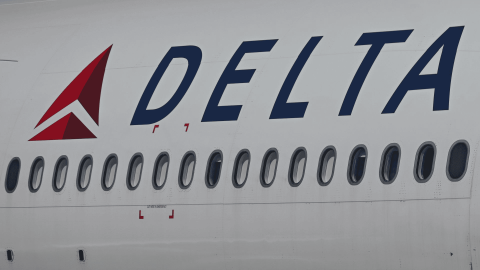Delta Air Lines (DAL) Stock Price Could Remain Range-bound: Zacks Research
Zacks Equity Research has recently issued a Neutral recommendation for Delta Air Lines (DAL), following a previous Underperform rating. The stock is currently valued at $55.10 (as of October 21, 2024), with a target price of $59.00 over a 6-12 month horizon. Delta has faced significant challenges, including rising fuel and labor costs, as well as a major IT outage, but has benefited from the post-pandemic recovery of air travel demand. Zacks advises that, given the mixed outlook, investors should hold off on large commitments until a more favorable entry point arises.
Key Drivers Impacting Delta's Stock Performance
Post-Pandemic Travel Recovery
Delta continues to benefit from the unexpectedly strong recovery of air travel, particularly in the leisure segment. The company reported a 7% increase in managed corporate travel sales in Q3 2024, notably driven by sectors such as technology, media, and banking. The rebound in business travel has added to its strength, though competition and rising costs in other areas temper this optimistic outlook.
Impact of Rising Fuel and Labor Costs
Delta's operating costs are significantly impacted by rising fuel prices, driven by ongoing production cuts from major oil-producing nations and geopolitical tensions. For Q4 2024, fuel costs are expected to fall between $2.20 and $2.40 per gallon, putting pressure on margins. Additionally, Delta's non-fuel unit costs—primarily related to labor—are forecasted to rise by 3% year-over-year due to a pilot contract negotiated in early 2023. Labor costs, which increased 11% in Q3 2024, present a major hurdle for profitability in the near term.
IT Outage and Its Financial Impact
The global IT outage in July 2024 significantly disrupted Delta's operations, leading to the cancellation of thousands of flights and a reported $500 million impact on Q3 earnings. This outage was particularly damaging due to Delta's dependence on Microsoft systems for crew scheduling. The incident reduced Delta's Q3 earnings by approximately 45 cents per share, reflecting both revenue losses and added compensation costs for affected passengers.
Stock Overview
Price and Volume Statistics
Current Price: $55.10
Price Target (6-12 Months): $59.00
52-Week Range: $30.60 - $56.48
Market Cap: $36 billion
Year-to-Date Price Change: +38.7%
Dividend Yield: 1.08% ($0.60 annual dividend)
Delta’s share price has risen 38.7% year-to-date, reflecting both the general recovery in air travel and its positioning within the industry. The stock currently trades at a P/E ratio of 9.1, which remains relatively low compared to the broader market.
Financial Performance
Revenue and Earnings
For Q3 2024, Delta reported revenues of $15.68 billion, a slight 1.2% increase year-over-year, surpassing Zacks' estimates by 2%. However, earnings per share (EPS) fell short of expectations, coming in at $1.50 versus the forecast of $1.56. This miss was largely attributed to the rising costs of labor and the IT outage mentioned earlier.
Despite these challenges, Delta's liquidity remains strong. As of Q3 2024, the company had $4 billion in cash and cash equivalents, compared to $3.3 billion in short-term debt, giving it the flexibility to manage short-term obligations effectively.
Passenger Revenue Breakdown
In 2023, Delta’s passenger revenues, which accounted for 84.2% of its total, rose by 22% year-over-year to reach $48.9 billion. Ticket sales, loyalty travel awards, and travel-related services were the primary contributors. The company derives a majority of its passenger revenue from domestic operations, which contributed 69.5% of the total in 2023.
Challenges Facing Delta
Competitive Pressures and Discounting
In addition to high operating costs, Delta faces discounting pressures from competitors, particularly in the low-cost segment of the market. This competitive environment puts downward pressure on margins, even as Delta attempts to balance premium pricing and service offerings.
Debt and Capital Structure
Delta's adjusted net debt at the end of Q3 2024 stood at $18.7 billion, but the company’s liquidity and cash flow generation provide some cushion against these liabilities. Delta’s debt-to-equity ratio remains higher than the industry average, highlighting the need for effective debt management to maintain financial flexibility in a volatile cost environment.
Outlook for Investors
Q4 and FY 2024 Forecasts
Looking ahead, Delta expects Q4 2024 EPS to range between $1.60 and $1.85 per share, with total revenues projected in the $13.9-$14.2 billion range, representing a 2-4% year-over-year increase. The company anticipates a modest 3-4% increase in capacity (available seat miles) in the final quarter. Non-fuel unit costs are expected to increase by 3%, while fuel prices are projected to remain between $2.20 and $2.40 per gallon.
Long-Term Target and Valuation
Zacks has set a 12-month price target of $59.00 for Delta, implying moderate upside from its current price of $55.10. The stock trades at 0.61x forward 12-month sales, which is relatively low compared to the broader market, providing potential value for long-term investors.
Delta's valuation, along with strong demand for air travel, suggests that the stock could perform in line with the broader market over the next year. However, the pressures of rising costs and competitive dynamics create a risk factor for earnings growth.
Investor Recommendations
Short-Term Recommendation: Hold
For investors with a short-term horizon (1-3 months), Delta’s mixed outlook suggests maintaining a Hold position. While the recovery in air travel demand supports the company’s top-line performance, rising costs and operational challenges like the IT outage cloud near-term profitability.
Long-Term Recommendation: Neutral
Over a 6-12 month horizon, Zacks recommends a Neutral stance, advising investors to monitor the company’s ability to manage costs effectively and capitalize on air travel demand growth. Delta’s financial health remains robust, but the risks from high fuel prices and labor expenses require cautious optimism.
Disclaimer
This report is for informational purposes only and should not be construed as investment advice. While the analysis is based on reliable sources, market conditions can change rapidly, and investors should conduct their own due diligence before making investment decisions. It is advisable to consult a financial advisor to determine the suitability of any investment.
